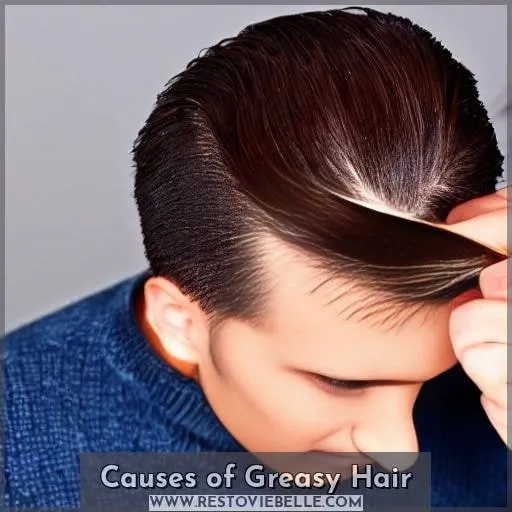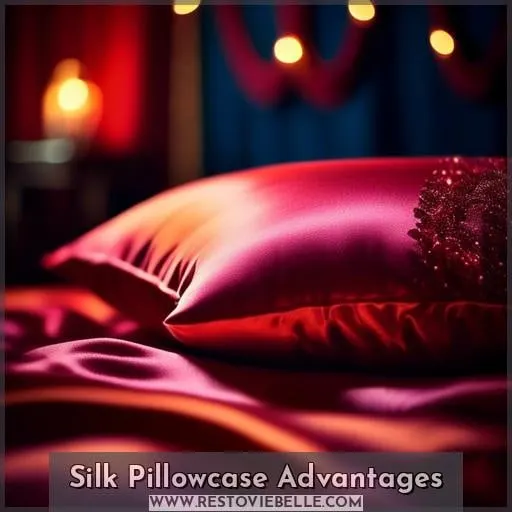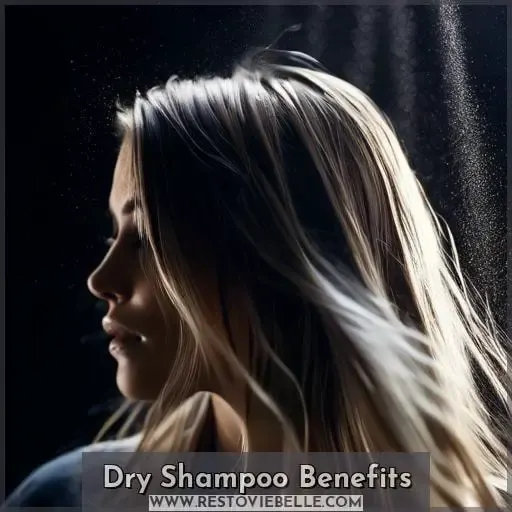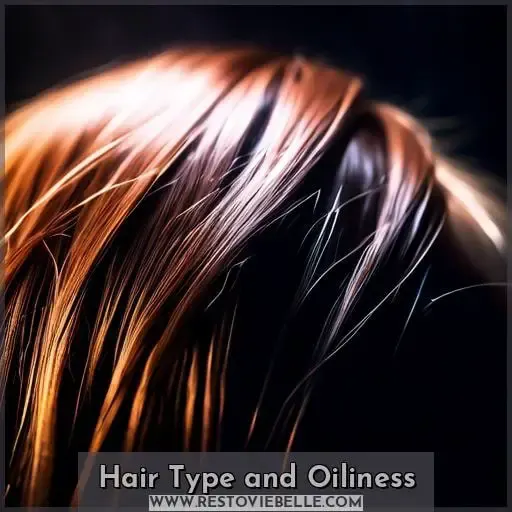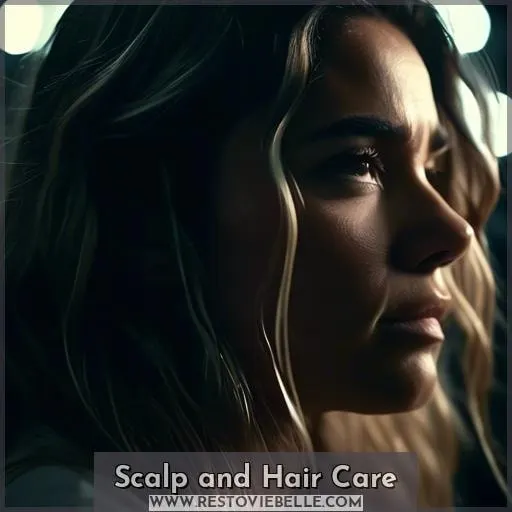This site is supported by our readers. We may earn a commission, at no cost to you, if you purchase through links.
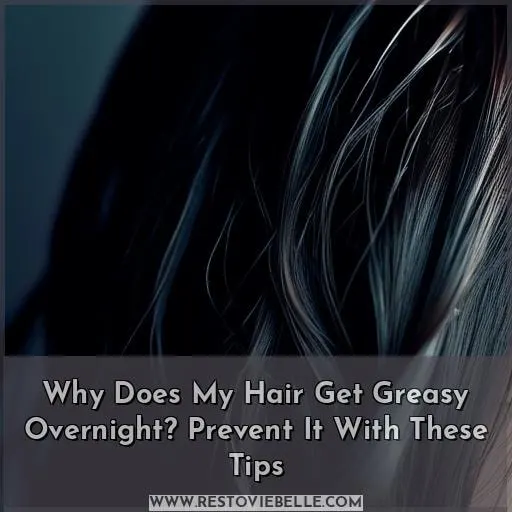 Ever wake up to a slick surprise? You’re not alone. Your hair’s overnight transformation into a greasy canvas is a real head-scratcher.
Ever wake up to a slick surprise? You’re not alone. Your hair’s overnight transformation into a greasy canvas is a real head-scratcher.
It’s not just about the oil your scalp churns out; it’s a cocktail of factors, from the pillow you dream on to the hormones that dance through your body.
Fear not, for you’re about to embark on a journey to tame that oily beast with savvy tips and tricks.
Keep reading to learn why your hair gets greasy overnight and how to prevent it.
Your hair gets greasy overnight due to the natural production of sebum by your scalp’s sebaceous glands. This oil production can increase during sleep and may be exacerbated by factors like dirty pillowcases or certain hair care habits.
Table Of Contents
- Key Takeaways
- Causes of Greasy Hair
- Prevention Strategies
- Silk Pillowcase Advantages
- Dry Shampoo Benefits
- Hair Type and Oiliness
- Scalp and Hair Care
- Frequently Asked Questions (FAQs)
- How does the type of water (hard vs. soft) affect the greasiness of hair overnight?
- Can certain medications or supplements contribute to increased sebum production leading to greasy hair?
- How does the change in seasons or weather conditions impact the oiliness of hair during the night?
- Are there specific hairstyles or hair treatments that can exacerbate greasiness while sleeping?
- How does the frequency of changing hair care products influence the overnight oil production in hair?
- Conclusion
Key Takeaways
- Sebum overproduction can cause hair to become greasy overnight, as the scalp’s sebaceous glands may produce excess oil, especially during hormonal fluctuations or due to genetic factors.
- Pillowcase material matters; cotton pillowcases can absorb moisture and lead to a dry scalp, which then triggers more oil production. Silk pillowcases can help maintain the hair’s natural moisture and reduce greasiness.
- Hair washing habits, such as overwashing, can strip the scalp of natural oils, prompting it to produce more sebum, while underwashing can allow oil and product buildup, both leading to greasy hair.
- Using the right hair care products and techniques, like dry shampoo to absorb excess oil and avoiding overbrushing, can help prevent hair from becoming greasy overnight.
Causes of Greasy Hair
If you’re waking up to greasy hair, it’s likely due to a combination of factors including sebum overproduction, pillowcase hygiene, your hair washing habits, sleep agitation, and hormonal influences.
Your scalp naturally produces sebum, which is essential for healthy hair, but too much can lead to oiliness. Ensuring your pillowcases are clean and adjusting your hair care routine can help manage the grease.
If you’re experiencing significant changes in oiliness, it’s wise to consult a doctor to rule out any underlying conditions.
Sebum Overproduction
You might be wondering why your hair turns into a greasy mess overnight, even when you’ve just washed it. Well, it’s not just you; many people experience this slippery situation. The culprit? Often, it’s an overzealous scalp pumping out sebum like it’s going out of style.
Sebum is your hair’s natural conditioner, but too much of it and you’re in slick city. Hormonal changes, stress, genetics, and even your diet can send your oil glands into overdrive, leaving you with that not-so-fresh feeling come morning.
But don’t fret, there are ways to combat the grease! For starters, consider your shampoo routine. If you’ve got oily hair, reach for a clarifying cleanser to cut through the slick. And when it comes to conditioner, think light and breezy, applying only to the ends where your hair really needs it.
Dry shampoo can be your best friend, soaking up oil and giving your roots a lift.
And here’s a pro tip: try sleeping with your hair up in a loose bun or pineapple to keep it from getting all cozy with oily pillowcases. Speaking of which, silk pillowcases aren’t just fancy; they’re functional, reducing friction and not hoarding oil like cotton ones do.
Pillowcase Hygiene
Your pillowcase might just be the secret saboteur of your hair’s freshness. Imagine this: night after night, it’s collecting a cocktail of oil buildup, dead skin, and yesterday’s hair products, only to throw a greasy party on your scalp.
It’s like a crime scene for cleanliness, and your hair is the victim. To keep your hair from looking like it’s been dipped in yesterday’s fryer, consider a silk pillowcase. It’s like a superhero for your strands, reducing friction and not inviting as much grime to the overnight bash.
Plus, giving your pillowcase a weekly spin in the wash will help keep that oil and product buildup from plotting against you. And let’s not forget, a good scalp massage during your hair washing ritual can help ensure your roots aren’t hoarding excess oil.
Keep it clean, folks, and your hair will thank you by not going on a grease strike overnight.
Hair Washing Habits
Continuing from the woes of dirty pillowcases, let’s dive into your hair washing habits.
You might think that scrubbing your locks daily will keep the grease at bay, but you could be waving a red flag to your scalp, shouting, Produce more oil, please! Over-cleansing can strip your hair of natural oils, leading to a sebum soiree on your scalp.
On the flip side, infrequent washing can turn your head into a build-up bonanza, with oils and products throwing a rave. Aim for a happy medium with your hair washing frequency, and when you do wash, massage that clarifying shampoo into your scalp like you’re kneading dough—gently, but with purpose.
Sleep Agitation
Tossing and turning at night? It’s not just your sleep that’s getting disrupted. Your hair’s getting a workout too, leading to that not-so-chic I’ve been through a hedge backwards morning look. When you’re in the throes of sleep, your scalp gets a stress hormone cocktail, courtesy of cortisol, which can kick sebum production into high gear.
Combine that with a warm sleep environment and you’ve got the perfect recipe for a greasy hair disaster.
But wait, there’s more. If emotional turmoil or an anxiety disorder is part of your nightly routine, your scalp might just be sweating it out with you, contributing to that waxy hair feel come sunrise.
And let’s not forget, if you’ve slathered on hair products before hitting the hay, hoping for luscious locks, you might just wake up to an oil slick instead.
So, what’s the secret to waking up with hair that doesn’t look like it’s been in a food fight? Keep your cool, literally. A cooler room might help keep those night sweats at bay. And if you’re prone to a restless night, consider a hair bun to keep your strands out of trouble.
Remember, a little prep can go a long way in the battle against the dreaded morning grease.
Hormonal Influences
Hormonal fluctuations can be like a rollercoaster ride for your hair, with ups and downs that leave your locks looking lush one day and greasy the next.
During puberty, pregnancy, childbirth, and even menopause, your body’s hormone levels are on the move, and so is the production of sebum, that slick substance that can make your hair go from fab to flat overnight.
It’s like your scalp’s own little oil factory kicks into overdrive, thanks to hormones like testosterone and estrogen. So, if you’re finding your hair has more shine than a greased lightning bolt, it might just be your hormones having a bit of a party.
Prevention Strategies
If you’re struggling with greasy hair when you wake up, you’re not alone.
To combat this, consider using a shampoo formulated for oily roots and pair it with a lightweight conditioner to avoid weighing down your hair.
Additionally, applying dry shampoo before bed can help absorb excess oil overnight, and using a detangling spray can keep your hair manageable without adding grease.
Opting for a loose bun or pineapple hairstyle can also prevent oil from spreading down your hair shaft as you sleep.
Shampoo for Oily Roots
Continuing from the discussion on the causes of greasy hair, let’s dive into the world of shampoos for oily roots.
If you’re waking up to a slick scalp more often than not, it’s time to play detective with your shampoo bottle. Shampoo recommendations often include looking for natural alternatives like those with tea tree oil or salicylic acid, which act as a dynamic duo against oil buildup.
Ingredient analysis is key; you want to avoid heavy conditioners and instead opt for clarifying agents that show no mercy to grease. And if you’re fretting about hair loss prevention, rest easy knowing the right shampoo can help balance oil production without stripping your hair bare.
So, lather up with confidence, and let’s turn those greasy mornings into a distant memory!
Lightweight Conditioning
When it comes to keeping your mane from becoming an oil slick overnight, it’s all about the right touch with conditioner. Think of conditioner like a rich dessert—indulge too much, and you’ll feel it weighing you down.
Stick to a dollop the size of a coin, and apply it only to the mid-lengths and ends of your hair.
And remember, not all conditioners are created equal; look for ones with lightweight ingredients that won’t throw a greasy party on your scalp. If you’re conditioning more often than a lovestruck teenager texts their crush, it’s time to dial it back.
Fine or oily hair types should keep the conditioner rendezvous to just 2 or 3 times a week. And for those days when your hair feels like it’s gone through a deep-fryer, reach for a detangling spray as a conditioner alternative to keep things light and breezy.
Dry Shampoo Use
After transitioning from the topic of lightweight conditioning, let’s dive into the world of dry shampoo—a true lifesaver for those mornings when washing your hair feels like climbing Mount Everest. Dry shampoo works its magic by absorbing excess sebum, the culprit behind that not-so-fresh feeling.
But it’s not just about spraying and going; there’s an art to it. To avoid the dreaded white residue, remember to keep the can a good 12 inches from your roots and target only the greasy areas.
When it comes to frequency, don’t overdo it. Using dry shampoo more than twice a week can be a one-way ticket to Scalp Irritation Central. And if you’re worried about the ingredients, you’ve got options. From starch-based to alcohol-free, there’s a dry shampoo out there that won’t ruffle your feathers—or your hair for that matter.
For those nights when you’re plotting to outsmart your oily scalp, consider applying dry shampoo before bed. It’ll have all night to absorb the oil, so you can wake up looking like you’ve got your life together.
And if you’re feeling adventurous, why not try a dry shampoo alternative like baby powder? Just a sprinkle could work wonders.
Detangling Spray Benefits
Detangling spray is your secret weapon against the dreaded morning mop look. Imagine waking up, your hair a wild, greasy mess, and reaching for that magic bottle.
A few spritzes and you’re not wrestling with knots, but gliding through with grace. It’s like a fairy godmother for your hair, transforming it from a tangled pumpkin into a sleek carriage.
Plus, it keeps your hairbrush hygiene on point, so you’re not brushing yesterday’s oil back into your clean strands. And when it comes to overnight hairstyles, a detangling spray can be a real lifesaver, ensuring your morning hair isn’t a bird’s nest.
Hairstyles for Sleep
When it comes to preventing greasy hair overnight, adopting the right hairstyles can be a game-changer. Opt for a pineapple hair style, which involves gathering your hair at the top of your head in a loose bun, to minimize contact with oils from your scalp.
Additionally, applying a bit of nighttime dry shampoo to the roots can work wonders by absorbing excess oil while you catch your Z’s. Remember, the goal is to keep hair oil buildup at bay, so consider the material of your pillowcase as well.
Silk or satin pillowcases can reduce friction and are less likely to absorb grease compared to cotton.
Lastly, don’t forget about scalp exfoliation; a weekly scrub can help remove dead skin cells and product residue, ensuring your scalp stays fresh and your hair less oily.
Silk Pillowcase Advantages
Switching to a silk pillowcase can be a game-changer for managing greasy hair overnight. Silk’s smooth texture reduces friction, which not only helps prevent hair breakage but also minimizes the agitation that can stimulate sebum production.
Additionally, unlike cotton, silk doesn’t absorb as much oil and grime from your hair and skin, keeping both cleaner as you sleep. This can be particularly beneficial for those with oily hair types, as it helps maintain the balance of natural oils without contributing to greasiness.
Friction Reduction
Switching from your regular pillowcase to one made of silk can be a game-changer for your hair. Silk’s smooth texture means less friction on your hair as you toss and turn, which translates to less oil buildup and fewer tangles by morning.
It’s like giving your hair a nightly spa treatment without lifting a finger. Plus, silk doesn’t hog your hair’s natural moisture the way cotton does, so you can wake up to locks that are as hydrated as a cucumber in a pitcher of spa water.
So, if you’re tired of battling greasy hair, it might be time to slip into something more comfortable—like a silk pillowcase.
Buildup Prevention
Switching to a silk pillowcase can be a game-changer in your scalp care routine. Silk’s smooth surface means less friction, so your overnight hairstyles stay put without rubbing your roots into an oily frenzy.
Plus, silk doesn’t hog your hair’s natural ingredients like cotton does, keeping those oil-absorbing products working all night long.
Grime Absorption
Continuing from the benefits of preventing buildup, let’s talk about how silk pillowcases are your secret weapon against grime absorption. These smooth operators aren’t just about luxury; they’re about keeping your hair’s cleanliness on point while you’re off in dreamland.
- Silk’s smooth surface means less friction, so your hair won’t rub the wrong way.
- They’re less absorbent than cotton, so they won’t steal your hair’s much-needed moisture.
- Silk pillowcases can help maintain your scalp’s hygiene, reducing the risk of scalp irritation.
- They’re less likely to harbor product residue, keeping your hair fresher between washes.
- By reducing grime buildup, silk pillowcases contribute to overall scalp health, helping you wake up not just well-rested but also well-coiffed.
Dry Shampoo Benefits
Dry shampoo can be a quick fix for greasy hair, especially when you’re short on time or need to extend the life of your hairstyle.
It works by absorbing excess sebum, which is the natural oil produced by your scalp that can cause hair to look oily.
By using dry shampoo, you can lift your roots and add volume to your hair, giving it a fresher appearance without the need for immediate washing.
Sebum Absorption
Dry shampoo is your secret weapon against the battle of the bedtime grease. Think of it as your hair’s night guard, soaking up excess sebum while you’re dreaming away.
The trick? Apply it right before you hit the hay. This way, it works overtime, absorbing oil and preventing that morning mirror scare of greasy locks.
But remember, it’s not just about spraying and praying. Aim for the roots, where oil parties hard, and give your hair a gentle tousle or brush through in the morning to distribute the magic evenly.
And hey, pairing it with a silk pillowcase? That’s like giving your hair a first-class ticket to Freshville. Silk reduces friction and doesn’t hog your hair’s natural oils, making it the perfect partner in crime for keeping your mane clean and voluminous.
So, embrace the dynamic duo of dry shampoo and silk for sebum control that’ll have you waking up looking like you just stepped out of a shampoo commercial.
Root Lifting
Continuing from the discussion on sebum absorption, let’s dive into the benefits of dry shampoo for root lifting.
When you’re battling greasy hair, dry shampoo is your knight in shining armor. It’s not just a quick fix for absorbing excess oil; it also works wonders for your hair’s root volume.
A sprinkle at the roots, a gentle scalp stimulation, and voilà – you’ve got yourself an instant lift-off. This little trick is a game-changer for hair styling, especially when you’re aiming for that just-stepped-out-of-a-salon look.
Plus, it’s a lifesaver for those days when product buildup seems to weigh down your locks.
Volume Promotion
Continuing from the root-lifting wonders of dry shampoo, let’s talk volume boost.
Imagine this: you wake up, and your hair’s as flat as a pancake. Enter dry shampoo, your secret weapon for that ‘just-styled’ salon look. A quick spritz at the roots, and it’s like your hair’s had a double shot of espresso – suddenly, it’s got body, it’s got bounce, and you’re ready to take on the world.
It’s not just about soaking up oil; it’s about giving your clean locks that extra oomph. So, go ahead, give your hair a little love with a volume boost that lasts all day.
Hair Type and Oiliness
When considering why your hair might feel greasier in the morning, it’s essential to recognize the role of hair characteristics and oil production.
Fine hair, for instance, tends to appear oilier faster than thicker hair because there’s less surface area for the sebum to spread out. If you have oily skin, this can also contribute to the likelihood of having oilier hair, as the same glands produce sebum both on your scalp and skin.
Sebum itself is crucial for keeping your hair healthy by maintaining moisture and protecting it from environmental damage, but an overproduction can lead to hair looking and feeling greasy.
Fine Hair Propensity
If you’re wrestling with greasy hair come morning, your fine hair might be the culprit. Fine hair is like a magnet for oils, making your nightly routine crucial for maintaining that fresh, bouncy look.
Think of your scalp as a garden; without the right care, it can quickly become overgrown. Product buildup is the weed in this scenario, choking your hair’s natural vibrancy.
To keep your hair’s moisture balanced and your scalp health in check, it’s essential to choose your products wisely. Lighter, clarifying options can prevent your hair from being weighed down, ensuring you wake up with hair that’s ready to take on the day, not looking like it’s already been through a week’s worth of stress.
Oily Skin Correlation
Just like fine hair has its quirks, so does your skin type, especially when it comes to the oiliness of your hair. If you’ve ever wondered why some folks can skip a day (or three) between washes without a hint of grease, while you’re battling the slick by noon, genetics, diet, and stress might be the culprits behind the scenes.
- Genetics: Just like the color of your eyes, the oiliness of your scalp can be a family heirloom. If your parents have oily skin, chances are you’ve inherited the trait, making your scalp more generous with its sebum production.
- Diet: What you eat influences more than just your waistline. High-glycemic foods, dairy, and saturated fats can rev up oil production, turning your hair from fab to drab faster than you can say extra fries.
- Stress: Ever noticed your hair getting greasier during exam season or ahead of big presentations? Stress sends your hormones on a rollercoaster, telling your oil glands to kick into high gear.
So, while you can’t pick your family or always dodge stress, tweaking your diet and embracing stress-busting activities might just give you the upper hand in your battle against the grease.
Sebum’s Role
Given the intricate dance between sebum production and scalp health, it’s clear that sebum isn’t just an oily nuisance but a crucial player in the health of your hair and scalp. As we’ve seen, sebum production can be influenced by a variety of factors, from hormonal changes to the products you use on your hair.
| Aspect | Description |
|---|---|
| Sebum Production | Essential for maintaining scalp health, but overproduction can lead to greasy hair. |
| Scalp Treatments | Regular use of clarifying treatments can help manage sebum levels and prevent buildup. |
| Hair Follicle | Sebum is produced by glands in the hair follicle, playing a vital role in hair protection. |
| Oil Regulation | Balancing sebum production is key; too much or too little can lead to scalp and hair issues. |
Scalp and Hair Care
To tackle greasy hair that develops overnight, it’s essential to consider your scalp and hair care routine.
Using clarifying treatments can help remove product buildup, which contributes to oiliness.
Additionally, massaging your scalp with the right technique can stimulate it without overproduction of oil.
Maintaining clean brushes and pillowcases can prevent reintroducing oils and residue to your hair.
These steps are crucial in managing sebum levels and keeping your hair feeling fresh.
Clarifying Treatments
Unlocking the Secret to Fresher, Lighter Locks
Ever felt like your hair’s throwing a tantrum, refusing to shine or behave, no matter how much you cajole it with your regular shampoo? It’s probably screaming for a detox, and here’s where clarifying shampoo swings into action.
Think of it as the superhero your hair didn’t know it needed, swooping in to rescue your locks from the clutches of buildup and grime.
Clarifying shampoo is your go-to when your mane feels weighed down by invisible foes—oils, dirt, and that sneaky product buildup. It’s like hitting the reset button, giving your hair a fresh start. But, like all good things, moderation is key.
Dive into this deep cleanse once a week or monthly, depending on your hair’s SOS signals.
For those who love a DIY challenge, why not whip up your own clarifying concoction? A simple blend of baking soda and apple cider vinegar can work wonders, stripping away the unwanted guests without crashing the party.
Just remember, this isn’t an everyday affair. Overuse could turn your hair’s healthy shine into a distress signal.
And for the skeptics wondering if this magic potion is for everyone, here’s the scoop: While clarifying shampoo is a universal soldier, battling buildup across all hair types, it’s wise to consult the hair gods (or, you know, a dermatologist) if you’ve got a sensitive scalp or are navigating the choppy waters of hair treatment aftermaths.
So, whether you’re reaching for that bottle off the shelf or mixing up a storm in your kitchen, embracing clarifying treatments is like giving your hair a breath of fresh air. Just remember, it’s all about balance. Too much of a good thing, and you might just find yourself back at square one.
Scalp Massaging Techniques
After diving into the world of clarifying treatments, it’s time to turn our attention to the magic of scalp massaging techniques. Think of it as the secret sauce to keeping your mane’s oil production in check while giving your scalp the TLC it deserves.
-
Scalp Exfoliation: Kick things off with a gentle scalp exfoliator. This step is crucial for removing dead skin cells and product buildup, paving the way for healthier hair growth. Plus, it feels pretty amazing.
-
Scalp Stimulation: Get those fingers moving or grab a scalp massager. The goal here is to boost scalp circulation, which can lead to healthier hair. Imagine your scalp as a garden; you’re tilling the soil to ensure your hair, the plants, have the best environment to thrive.
-
Scalp Moisturizer: Finish with a light scalp moisturizer or oil. This step is like sealing in all the good work you’ve done, ensuring your scalp stays hydrated but not greasy. Remember, a happy scalp equals happy hair.
By incorporating these techniques into your routine, you’re not just fighting off greasiness; you’re setting the stage for stronger, healthier hair. Plus, who doesn’t love a good scalp massage? It’s like a mini spa session right before bed.
Brush and Pillowcase Hygiene
Continuing from the importance of scalp massaging techniques, let’s dive into the nitty-gritty of brush and pillowcase hygiene.
You know the drill: a clean scalp starts with clean tools. So, give your hairbrush a spa day by washing it weekly to strip away that sneaky hair product buildup.
And don’t let your pillowcase become a petri dish for scalp oiliness; toss it in the wash every week to keep those greasy hair culprits at bay.
Frequently Asked Questions (FAQs)
How does the type of water (hard vs. soft) affect the greasiness of hair overnight?
Hard water, with its high mineral content, can leave a residue on your hair, making it feel greasy and heavy.
Soft water, while less damaging, can sometimes make hair limp and overly slick.
Can certain medications or supplements contribute to increased sebum production leading to greasy hair?
Yes, certain medications and supplements can indeed ramp up sebum production, leading to that unwelcome morning surprise of greasy hair.
Hormonal medications, particularly those that influence testosterone levels, can turn your scalp into an oil slick while you snooze.
How does the change in seasons or weather conditions impact the oiliness of hair during the night?
Seasonal changes, like the shift from summer to winter, can turn your hair into a greasy mess or a dry tangle.
In the sweltering summer, your scalp goes into overdrive, pumping out oil to combat the heat and humidity, leaving you with that not-so-fresh feeling by morning.
Come winter, the cold, dry air tricks your scalp into thinking it’s in the Sahara, cranking up the oil production to protect itself.
So, whether you’re battling the summer slick or the winter grease, it’s all about finding that Goldilocks zone for your hair care routine.
Are there specific hairstyles or hair treatments that can exacerbate greasiness while sleeping?
Tight hairstyles like high ponytails or buns can pull on your scalp, spreading oils more quickly and making hair appear greasier.
Overusing products, especially heavy conditioners near the roots, can also weigh hair down, leading to a greasier look by morning.
How does the frequency of changing hair care products influence the overnight oil production in hair?
Frequently changing hair care products can disrupt your scalp’s balance. This disruption can potentially increase oil production as your scalp tries to adjust.
Stick to a routine to give your hair time to adapt and find equilibrium.
Conclusion
As the saying goes, An ounce of prevention is worth a pound of cure, especially when tackling why your hair gets greasy overnight. By understanding the root causes, from sebum overproduction to pillowcase hygiene, you’re well-equipped to keep your locks fresh.
Embrace shampoo tailored for oily roots, switch to silk pillowcases, and incorporate dry shampoo into your routine. Remember, managing greasy hair is a blend of the right care and smart habits. Your journey to vibrant, oil-free hair starts tonight.

